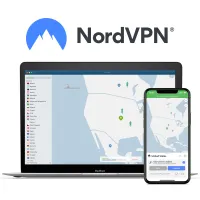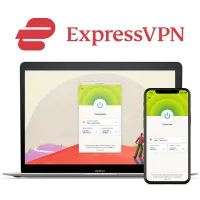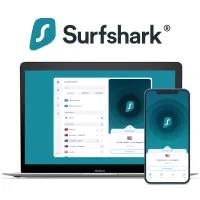TechRadar Verdict
It's hard to recommend FlowVPN. The inclusion of an OpenAI-powered chatbot feels gimmicky at best and the actual VPN is lacking in so many key areas. Instead of having a robust no-logs policy, FlowVPN explicitly states that your internet activity will be monitored and, with the VPN being based in the UK, there's not much stopping the authorities from seeing your personal information. When you throw in poor customer service, the absence of a money-back guarantee, and a very limited features list, you'd be much better off going for an established provider like ExpressVPN.
Pros
- +
OK speeds
- +
Use up to 10 devices simultaneously
Cons
- -
Major privacy concerns
- -
Poor customer support
- -
Minimal features
Why you can trust TechRadar
Click the link to jump down ▼
Who wants a VPN with an OpenAI-powered chatbot? Yeah, me neither. But, as brands try to jump on the AI bandwagon and stand out in the crowded VPN space, that's what FlowVPN has given us
Needless to say, it's far from being one of the best VPN services on the market, but keep reading as I take a look at whether the AI chatbot offers any benefit to the VPN, how FlowVPN stacks up with the rest of the VPN market, and answer the all-important question—should you try FlowVPN for yourself?
FlowVPN isn't exactly a newcomer to the industry, rather its ultimate owner Portable LTD was formed in the UK in 2011. They're a medium-scale provider that operates "over 100 servers" in 60+ locations, but the exact number isn't publicly stated (which doesn't exactly inspire confidence).
The first real red flag for FlowVPN is the jurisdiction it's based in. The United Kingdom is part of the Five Eyes information-sharing pact, which means that it is one of the least suitable locations for a VPN provider. The relationship between GCHQ and the NSA is well documented, and both organizations are keen to undermine VPN privacy wherever possible. Combined with their lack of no-logs policy, FlowVPN isn’t a suitable choice when it comes to handling sensitive personal information.

Sam Dawson is a cybersecurity and VPN expert who has over four years of experience reviewing security-related software products. Between running a penetration testing company and finishing a PhD on speculative execution attacks at the University of Kent, he contributes his wealth of knowledge here at TechRadar.
FlowVPN pricing
FlowVPN is positioned as a cheap and cheerful budget VPN provider. There are three different plans on offer: monthly, quarterly, and annual. All of the plans offer the same functionality and features, and the only difference between them is the duration of the subscription and the prices.
FlowVPN’s monthly plan is priced at $6.99 per month. This is pretty cheap compared to most VPN providers, especially considering there are 60+ locations on offer. Unfortunately, the discounts don’t drop much lower from here.
Their quarterly plan is priced at $18, or $5.99 per month, which is roughly a 15% discount. Here’s another issue with FlowVPN: Their discount on the monthly plan is advertised at 30%. That’s not true. I'm not sure if this is just an issue in how their marketing is coded or outright deception, but either way, it's an odd claim.
Lastly, their annual plan is priced at $50.04, or $4.17 per month, which comes out to around a 40% discount. Unlike the previous plan, the website states this one correctly.
FlowVPN does not offer a free version and, while it does offer a five-day free trial, there's no money-back guarantee period. This is a real problem, and we've received a few reports of users being unable to cancel their free trial without contacting their payment provider, and being unable to get refunds if their trial expired and they began paying before they were able to cancel. You should therefore exercise caution when signing up for the free trial. At the bare minimum, you should use a virtual credit card that you can easily cancel.
For payments, FlowVPN accepts a wide variety of options, including the classic credit/debit cards such as American Express, MasterCard, and Visa. They also offer PayPal, various cryptocurrencies such as Bitcoin, and even gift cards as an option.
Privacy and encryption
FlowVPN uses AES-128 encryption to protect your data. While this can't be cracked with current supercomputer processing power, it’s surprising that FlowVPN doesn't offer an AES-256 option for added security. This more secure standard is supported by many of the leaders in the VPN space, and its absence speaks to how FlowVPN’s overall approach to security is lagging behind current industry practice.
FlowVPN offers access to the highly secure and widely trusted OpenVPN, IKEv2, and WireGuard protocols. The inclusion of WireGuard here is a major plus, however, it can only be used on certain platforms such as iOS and Mac. Unfortunately, FlowVPN also allows you to use several insecure protocols, such as PPTP and VPN over SSH.
In terms of features, FlowVPN doesn't seem to provide even the bare minimum. There is no mention of a killswitch anywhere, let alone anything more advanced such as split-tunneling or multi-hopping. Not having a killswitch is a major failing, it provides an extra layer of security and should be included with every VPN these days. FlowVPN should add a kill switch ASAP but there are far more pressing issues with this VPN.
A no-logs policy? Ha, forget it. FlowVPN's privacy policy explicitly states that the company actively monitors usage for a broad range of illegal activities, as well as some perfectly legal ones (like sending an email with an attachment over 20MB). Client information is handed over in response to any inquiry or warrant by law enforcement, so FlowVPN essentially tells you that your traffic is being monitored.
While it seems like this VPN works in China, the lack of technical competency and awful privacy policy means I cannot recommend this VPN for use inside China (in fact, it may be dangerous to do so). Instead, I'd suggest you check out NordVPN or ExpressVPN—especially if you’re looking for a P2P-friendly VPN, as none of FlowVPN’s servers support P2P traffic.
Streaming
The good news is that FlowVPN can unblock most major streaming services, including the likes of Netflix, Hulu, HBO Max, Disney+, Amazon Prime Video, and BBC iPlayer. Well, sometimes. FlowVPN just cannot do this consistently and I had to try multiple servers in the hope that one would suddenly work. Even after my testing, there didn't seem to be any real pattern when it came to accessing geo-blocked content, it just randomly worked at some point. In short, FlowVPN can unblock geo-restricted content on these services, but it cannot do so smoothly or consistently.
If streaming geo-blocked content is one of your top priorities, I recommend you go for ExpressVPN. ExpressVPN will consistently and effortlessly unblock all the geo-blocked content on the major streaming services listed above, and its superb speeds mean you'll get the smoothest streaming experience possible.
Speed and experience
I tested out three different servers in various locations to get an idea of how fast FlowVPN is. All of my tests were conducted on the same 100 Mbps connection using Ookla Speedtest for consistency.
First off, I connected to the UK server. As this is the server that's closest to my actual location, you would expect to see the highest numbers here. After a few inconsistent results at the beginning of my connection, I came back an hour later and found that the best results I got were 61.40 Mbps download and 17.93 Mbps upload. Honestly, this is a pretty decent result. There are certainly faster VPNs out there, but this isn’t awful by a long shot.
I tested the server in Germany next. This connection was far more consistent, clocking in at 55.74 Mbps download and 12.84 Mbps upload. All in all, these results were roughly in line with what I expected based on the UK tests.
Finally, I tested FlowVPN's US Northeast server. This performed a little lower than expected, clocking in at 38.62 Mbps download and 7.99 Mbps upload. Like the German server, the results of all my tests were consistent, so I can surmise that their servers are working properly. All in all, these results are pretty middling, but nothing egregious.
Customer support
FlowVPN's customer support provides the bare minimum. There's no live-chat support system, which is a major downside in this category, just a basic support ticket system and an FAQ on their website.
That's not great, and it gets worse. When I tested the support ticket system, I did not receive a reply. As there's no other way of getting help, this essentially means that FlowVPN provides no customer support. The FAQ is also very barebones and does not seem to provide any valuable information whatsoever. I found it particularly disconcerting that there’s a section with no meaningful advice on which VPN protocol to use beyond recommending PPTP and L2TP over OpenVPN.
I’ve also heard reports of customers being unable to cancel their free trials because of this apparently nonexistent customer support. As the terms of service make it clear that no refund will be given once the free trial is over, this means that signing up for a trial locks you into a payment. That's a situation that's shady at best, and frankly malicious at worst.
Compatibility
FlowVPN has Windows, Mac, iOS, and Android apps. Check the fine print here, however, as these apps were not created equal. You can only use the WireGuard protocol on the Mac and iOS apps, making them vastly superior. It’s a rare case where the Apple apps are better than the Windows and Android equivalents, but it took me a few connection attempts to get the Windows app working at all. There is no mention of Linux whatsoever on the FlowVPN website.
FlowVPN allows you to use up to 10 devices at a time according to their website. This is roughly consistent with the industry standard, but this number is going up all the time and many top-tier VPN providers are switching to an unlimited subscription policy.
Alternatives
1. The best VPN overall: NordVPN
NordVPN tops our list as the best VPN overall thanks to its excellent privacy, high speeds, and integrated suite of security tools. With unbeatable content unblocking power, amazing speeds, and customizable pricing, you'll only pay for what you need. See for yourself with a 30-day money-back guarantee, and get the best VPN on the market.
2. The best VPN for beginners: ExpressVPN
ExpressVPN offers a simple one-click connect interface so you can set it and forget it. Plus, it consistently unblocks Netflix, Amazon Prime Video, BBC iPlayer, and Disney+. Unlike FlowVPN, ExpressVPN has a strict no-logs policy that has been independently audited by third parties on an ongoing basis. With a 30-day money-back guarantee you can even put it to the test risk-free, too.
3. The best cheap VPN: Surfshark
If you've got a lot of devices to protect, or you just don't want to spend too much money on a VPN, Surfshark is a great choice. One subscription covers unlimited devices, so you can use as many as you want simultaneously. On top of fast connection speeds, Surfshark also keeps you safe with a password protection system that evaluates if your details are easy to guess, reused, or have been leaked online. Plus, with a 30-day money-back guarantee, you can try it for yourself and see how it compares to the more expensive services.
Verdict
FlowVPN is a medium-scale VPN provider with some major issues. Their privacy policy is barely worthy of the name as it allows far too much leeway for data collection and essentially gives FlowVPN carte blanche to kick you off the platform for practically any infraction. However, it’s far more likely that you won’t be able to get the service working effectively and be left out of pocket with no chance of a refund.
Beyond the frankly abysmal customer service, the VPN is based in a Five-Eyes jurisdiction, does not support P2P, and lacks features that any decent VPN has had for years. Their VPN protocol support is also not up to industry standards, allowing for the use of several outdated and dangerous protocols
In conclusion, I simply can't recommend this VPN. The blatant logging and sharing of personal data is unacceptable, and the combo of terrible customer support and no money-back guarantee is downright predatory and leaves users unable to get their money back. In short, I’d advise you to avoid this VPN and use a top-tier VPN like ExpressVPN instead.

An experienced writer and editor obsessed with tech for as long as he can remember, Alec Hawley has spent the past few years covering cutting-edge businesses for Startups. After a move to buzzing Berlin, he joined the Techradar VPN team in 2024 to cut through the jargon and give you straightforward advice on which VPNs are worth your money and which you should avoid like the plague.
We test and review VPN services in the context of legal recreational uses. For example:
1. Accessing a service from another country (subject to the terms and conditions of that service).
2. Protecting your online security and strengthening your online privacy when abroad.
We do not support or condone the illegal or malicious use of VPN services. Consuming pirated content that is paid-for is neither endorsed nor approved by Future Publishing.

Sam Dawson is a cybersecurity expert who has over four years of experience reviewing security-related software products. He focuses his writing on VPNs and security, previously writing for ProPrivacy before freelancing for Future PLC's brands, including TechRadar. Between running a penetration testing company and finishing a PhD focusing on speculative execution attacks at the University of Kent, he still somehow finds the time to keep an eye on how technology is impacting current affairs.
- Alec HawleyContributing Editor



